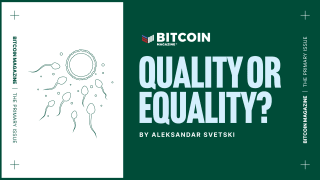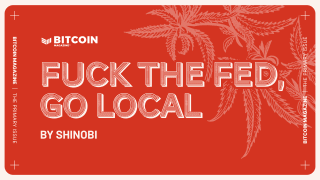There is no doubt a decision to tax cryptocurrencies has an significant impact on the way Bitcoin users spend their Bitcoin. While there seems to be very little the community can do to change or modify the IRS notice, there is the email address in the notice for anyone to communicate with the IRS to share their thoughts ([email protected]).
It is quite timely that a trio of lawyers, and two entrepreneurs have banded together very similar to the Justice League to be advocates for cryptocurrency users across the world. The name of this group is the Digital Asset Transfer Authority (DATA) and the board is made up of the following individuals:
Constance Choi, General Counsel, Payward Inc. (Kraken)
Edan Yago, CEO, Epiphyte
John Beccia, General Counsel, Circle Internet Financial
Patrick Murck, General Counsel, Bitcoin Foundation
Stan Stalnaker, Founding Director, Ven Currency and Hub Culture
The group sets out to help guide regulators and lawmakers to bring the right parties together before governments pass laws affecting cryptocurrency communities. Some may say Bitcoin doesn’t need an advocacy group. I would argue that if DATA could contribute to helping all governments treat cryptocurrency users fairly, their contributions would prove to be quite valuable to the future of all cryptocoins and help foster more locations where cryptocoin use is treated in a fair way.
The first board member I spoke with was Edan Yago, who I first heard at Bitcoin 2013 when he spoke about autonomous cities and governments.
He posted an update to his plans on his blog and shared that Honduras was lining up to be the first location of several autonomous zones:
“Other Central American countries, and in particular Guatemala and Panama are watching this development closely (and their leaders have indicated differing degrees of support). Additionally, elites in countries in other regions of the developing world have begun to take a more active interest. I and others who have been working on this project are seeing leaders reach out to us to quietly begin conversations. There is a surprising degree of high-level support for the plan. And if the zones are a success, there is going to be immense competitive pressure in the region for other countries to also create free zones, in order to stay competitive. We may have multi-country jurisdictions come into existence quite rapidly. This is a geo-political black swan of epic proportions just waiting to happen.” Edan Yago
With this development, he plans on assisting those who don’t have the luxury of living in autonomous zones through his work at DATA. The most recent effort will be seen at DATA’s annual meeting in Washington DC on April 10-11 at the same time the World Bank and IMF will be holding Spring meetings in this area. DATA has even arranged for Bitcoin and Ven to be accepted when booking a room at the Dupont Circle Hotel where part of the meeting is being held.
I called Edan to see why he is passionate about his work and hear more about his life leading up to his involvement with DATA.
Ruben Alexander: How are you doing?
Edan Yago: Fine. How are you?
I’m glad it���s Friday! (laughs)
(laughs) What’s nice about the weekend is that everyone leaves me alone and I can finally work.
Talk about your background before becoming involved with cryptocurrencies.
I’ve always been involved in trying to tackle elements of the world which I thought were unjust or wrong. In that respect, I’ve been a trouble-maker from a family of trouble-makers all my life.
I’ve been arrested a number of times. I’ve been on the losing side of the battle with “City Hall” so to speak.
One thing which I did was refuse to continue my service with the Israeli military. I did that because I was in the occupied territories. I saw what it was like. I came from a family background which was mostly wiped out in the Holocaust and I had grown up in the Apartheid South Africa and I protested against the Apartheid regime. To be in the occupied territory felt too similar [to my previous regime experiences]. That is one particular instance where I got paid a price and I also know I had zero effect on the overall outcome.
It was very hard to get the large amount of people who agreed with me to coalesce in an organized way around that idea and to act together, which is always the advantage that central authorities have. You will see [a] small number of police able to contain a very large angry crowd just because they are more cohesive and organized.
When Bitcoin came along, I think it did a lot more than just provide a new payment method or provide a new currency. It provided a lot more than just a consensus protocol around who owns what. You can see that an entire community, who think individual liberties and personal freedoms are important, a huge number of people were disillusioned about the fact that they were ever to affect change and manage to coordinate their efforts. Thousands of people are now involved and active in a way that they never were before. This is incredible! It is a knock-off effect of the ability to create consensus around one thing connected to all other aspects of our lives, which is very encouraging.
That is a big reason of why I got involved in Bitcoin.
You’ve lived in South Africa and Israel. What made you move to San Francisco, CA?
There were two things. First I decided to move to the US. I had grown up with a great admiration for America. The United States , its constitution and legal code, remain, to this day, one of the most advanced bastions and beacons of freedom for everyone in the world. I thought it was a land of freedom, and I still think that. I think that much more than most Americans. Part of the reason for this is I’ve seen the alternatives.
One of the very first things that I noticed when I came to the US is a lot of people have an “I just work here” attitude. Which is to say, they were born American, they grew up American, but they don’t necessarily remember which aspects of America differentiated it from the world. And beyond that they don’t recognize that the choices America makes as a country ha[ve] an impact far beyond the freedoms and the rights of Americans.
The choices that America makes affect the ability for the people around the world to point to a beacon and say, “This is an example of what we can achieve.” Revelations at the NSA don’t just hurt the credibility of the United States, they hurt the credibility of every person fighting for freedom and a civil society anywhere around the world.
The reason I came to San Francisco was, out of all the places in the United States, the place which still had the sense of opportunity and felt like “The Wild West” was the Bay Area and in San Francisco.
It is hard to think that America is still a beacon of freedom while we are continuing to hear about new privacy violations through the on-going series of Snowden leaks.
Despite all of that, it is still one of the freest places in the planet. Even with all of the immigration laws, it is still one of the most welcoming countries in the world. Even with all the corruption and the campaign finance distortion it is still one of the least corrupt countries in the world.
I think America is losing that status. And that is a terribly sad thing to see, but even what is even sadder is we have all these criticisms [against the US], and it is still one of the best examples of good governances that we have. I think we can do a lot better.
I have been following your developments on creating autonomous regions where a variety of governments coexists in specific zones governance experimentation is encouraged. Can you discuss this project?
You mean the Honduras project?
Yes.
I can say this project is very real. We will see the first zones sooner than most people expect. It will create an opportunity for experimentation that is [a] radically different way of organizing a community and society.
The last great experiment in creating a new form of government was with the constitution of the United States of America. It was an incredible success. We need more of that.
Now we have many tools that were not available like digital technologies, the internet, superior healthcare, and education. We also have the blockchain as a means for securing people’s privacy, preserving their rights, automating many of the services you associate with the government like registering property, making contracts, voting, securing people’s identity. We have a lot of new opportunities.
I believe we have an opportunity to develop and automate tools that turns many elements of the government into an engineering company where you see constant improvement. Most people think of the government as a liberal arts problem. We don’t see any progress. We are still debating the same problems that Plato and Aristotle debated two and a half thousand years ago without any particular resolution to those issues.
The more we can organize ourselves as a community and society to take a measurable and scientific approach at tackling social problems, the more we are going to be able to improve.
We also need competition. Competition is what will allow ideas to evolve or die. The less effective ideas go away, and the more effective ideas remain.
Do you see Bitcoin related businesses leaving a country with heavy restrictions against cryptocurrencies in favor of setting up shop in a freer country?
Absolutely. I see it all the time. There are a large number of companies I’m aware of that have left the US and have moved to Switzerland, Panama, or Singapore. The reason this is happening is because you have two dangerous combinations.
On one hand, an intention to have heavy regulation, on the other hand high uncertainty as to what that regulation will entail.
DATA was formed during or right after the San Jose Bitcoin conference in 2013. We realized if there was no organization in our industry to help protect our own users and help educate regulators on the nuances to help different users in our society. We would see people get burned [by bad cryptocurrency companies] and demand a reaction from the government. The government would come in and subject our industry to onerous regulations which would stunt the growth of cryptocurrencies.
To prevent this, we want to do two things. We want to help companies organize themselves in such a way that they are more transparent, providing the best possible service to their customers, and adopt the best practices for security. We also want to help regulators and those lobbying regulators to understand what the technology means, where it is going, and what the advantages are for everyone.
There is a huge debate in the Bitcoin community. Some think we need regulation and others think we don’t need any government help [regulation]. I think these stances create a false dichotomy. Both views look at the problem like a liberal arts problem…
Can you clarify what you mean by a liberal arts problem?
One of the great lines at the Gettysburg address, was when Lincoln said that we have a government of the people, by the people, and for the people. The liberal arts part of that is only of the people and by the people. The alternative which I think we have is to talk about that the opportunities technologies provide us to central regulation. To move to a world that is of the blockchain, by the blockchain, and for the people.
What that means is instead of forcing transparency or disclosures, or forcing FINCEN and MSB licences on Bitcoin exchanges, they can move to a world that uses Gregory Maxwell’s hash audit that proves an exchange has exactly as much money as they claim they have. If we want to protect our users, we can devise a uniform way of registration and identity. They could have specific information tied to a public key.
There are a lot more opportunities to solve these problems than these liberal arts resolutions.
The dichotomy is that we have to decide between more regulation or less regulation. There is a third option: replace regulation with technology.
You were speaking of some companies that have left the US or are in the process of leaving. What countries are trying to foster a free environment for cryptocoin users?
I don’t think there are any countries that are trying to foster Bitcoin yet. But what I do think is that there [are] specific countries who have an approach to trade and financial transactions that enable more financial freedom.
The biggest three examples are Panama, Switzerland, and Singapore. There’s also Jersey, Isle of Man, and possibly Germany. What they have in common is they tackle malfeasance as it occurs instead of trying to stamp out the possibility of it in advance. It is impossible to consistently stamp out bad actors in advance and places a large burden on good actors.
In the US, we place the burden of protecting consumers on regulators until they regulate problems out of existence. In other countries, they place the burden on the user, and they place the burden on the prosecutor. People have to be aware of what services they are using and take responsibility for their actions, assuming that any “bad actors” are going to consistently do harm to consumers and will be caught.
How will you obtain the resources necessary to have the DATA board, which is made up of four lawyers and one CEO, work towards preserving the rights of cryptocurrency users around the world?
The DATA board volunteers their time. Now we do intend to hire paid staff, because it is much too important to have to rely on the availability of volunteers. We will also have memberships and sponsors. We will have mainly corporate members, so our membership fees will be higher.
You have an event in April 10-11 where you are hosting the World Bank and the IMF. If someone were to go to the DATA annual meeting what would they expect?
The goal of the event is to get together people from the cryptocurrency world with people who will be making decisions that affect cryptocurrencies. We want to build the relationships that will be necessary to help solve future problems together without compromising the privacy and safety of our users.
This interview is part of a series of interviews of the DATA board members Edan Yago,Patrick Murck, Constance Choi, John Beccia, and Stan Stalnaker.
The DATA annual meeting will be in Washington DC on April 10-11. To find out more, visit DATA’s annual meeting website.










